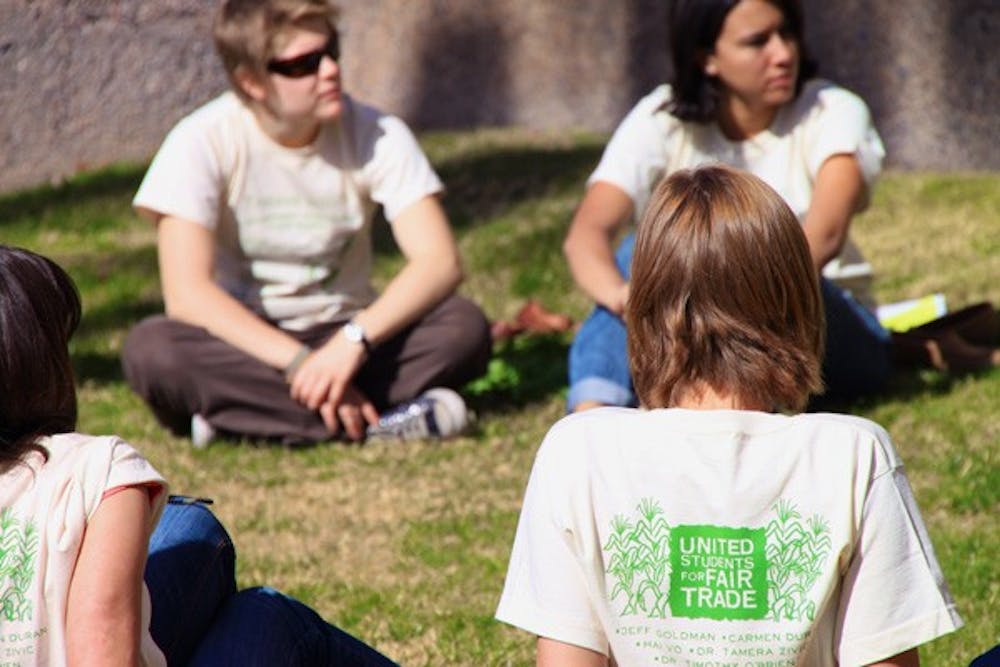Night falls as the students crowd into the atrium of the Farmer Educating Building at the Tempe campus, eagerly waiting to chow down on a dinner of fresh, locally grown salad, hummus, falafel and baklava. They’ve spent the day discussing sustainability, community gardens, poverty, economic policies and fair trade. These activist soul mates connected for the first time, becoming empowered to stand up and achieve a more sustainable future.
This was day two of Taking Root: A Southwest Sustainable Food Summit and the first youth fair food convergence in the history of the Southwest.
The summit was held Friday through Sunday on the Tempe campus and hosted by ASU’s United Students for Fair Trade club.
The club is a local chapter of a national network of student organizations advocating fair trade products, policies and principles.
More than 150 high school students, college students and community members from Arizona, Colorado, New Mexico and throughout the Southwest came together to attend the three-day event covering topics related to the economic, social and environmental impact of the food system.
Friday’s event centered on Carmen Duran, a lady from Tijuana, Mexico, and her journey to fight the injustices of maquiladoras, large factories in Mexico known for their labor exploitation and human rights abuses. She was the subject of the documentary “Maquilapolis” that chronicled her story and that of other workers filing a lawsuit against their employers for human rights violations and environmental destruction. Duran’s event was a standout part of the weekend for many attendees.
Speaking through a translator, Duran said that although problems with maquiladoras continue, the worker needs to learn his or her rights.
“If he doesn’t continue to learn his rights, he will continue to be enslaved by the factories,” she said.
Materials engineering junior Nick Chapman said he knew a little about the industry in Mexico, but the documentary was an important part of the summit.
“It gave people the chance to actually set up a dialogue with Ms. Duran,” he said. “It’s a much better way to get information.”
Ninth-grader Alexandra Turley of Paradise Valley High School, along with her fellow classmates, came to the summit as part of a special sustainability-focused campus program called CREST —Center for Research in Engineering, Science and Technology.
She called the documentary “mind-blowing,” as issues of poverty and hunger speak to her core and motivate her to do something.
Attendees said another popular session, held on Saturday, was about worm composting. Led by Colorado residents Amy Silverman and Nick La Haise, attendees learned that worm castings can restore soil fertility and make for a fast, practical way to maintain gardens.
Ninth-grader Jessie Lindenberg of Paradise Valley High School learned much from the different workshops, but said she enjoyed learning how to make a garden and minimize waste with the worm compost.
“I love nature and everything about it, so the fact that environments are being destroyed worldwide is really something,” she said.
As both a speaker and attendee, Silverman said the summit was a great place to hear what other people’s projects were at different schools.
“There’s a lot of positive energy here and a lot of good ideas from people who are really committed to making the world a better place they want to live in,” Silverman said.
Sustainability senior Stacia Turner agreed said the summit helped students network and create a sense of community. She said ASU definitely has a work to do. But the University is an institution that’s working toward being more sustainable.
On Sunday, attendees from the five different states broke out into small discussion sessions. In these sessions, they brainstormed strategic plans to implement sustainable programs, including community gardens and food policy councils. They also discussed improving the ASU Farmers Market and cooking demonstrations.
Sustainability junior Hannah La Luzerne, also co-president of the United Students for Fair Trade at ASU, said she wanted people to come away with good ideas and not get over-saturated with information from the summit.
For sustainability junior Kim Pearson, the Southwest coordinator for United Students for Fair Trade, hearing the positive feedback and sharing resources means all the hard work since October has been worth it.
She hopes they will “have something cohesive for their state with the culture and environment” of their campus and come away with a strategic plan for the semester and coming year.
Reach the reporter at naberra@asu.edu





